 Petzlover
Petzlover Mexican Hairless is originated from Mexico but Staffordshire Bull Terrier is originated from United Kingdom. Mexican Hairless may grow 17 cm / 7 inches higher than Staffordshire Bull Terrier. Both Mexican Hairless and Staffordshire Bull Terrier are having almost same weight. Mexican Hairless may live 5 years more than Staffordshire Bull Terrier. Both Mexican Hairless and Staffordshire Bull Terrier has almost same litter size. Both Mexican Hairless and Staffordshire Bull Terrier requires Low Maintenance.
Mexican Hairless is originated from Mexico but Staffordshire Bull Terrier is originated from United Kingdom. Mexican Hairless may grow 17 cm / 7 inches higher than Staffordshire Bull Terrier. Both Mexican Hairless and Staffordshire Bull Terrier are having almost same weight. Mexican Hairless may live 5 years more than Staffordshire Bull Terrier. Both Mexican Hairless and Staffordshire Bull Terrier has almost same litter size. Both Mexican Hairless and Staffordshire Bull Terrier requires Low Maintenance.
 Who can believe that the origin of these dogs which hail from Mexico, goes back more than 3,500 years?
Who can believe that the origin of these dogs which hail from Mexico, goes back more than 3,500 years?
Known as the Xoloitzcuintli dog or Xolo for short, they comes in different sizes – toy-, miniature and standard which means there are different sizes. Both coated- and hairless dogs can be found in the same litter.
There was a time when the dog nearly became extinct buts its numbers have recovered. This is no doubt because there was a time when the natives ate the dog’s flesh.
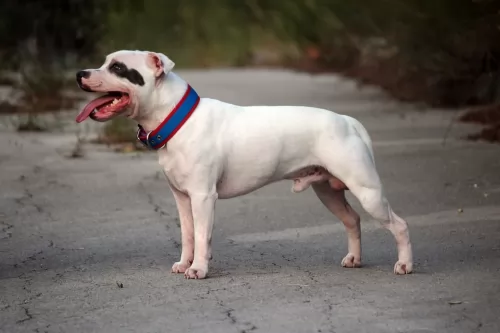 The Staffordshire Bull Terrier was first developed in the northern sections of Birmingham and in Staffordshire, England. The Staffie is a cross between a Black and Tan Terrie and the Bulldog, but had other breeds crossed in over time in order to create a bull-baiting dog and a fighting dog. In the Victorian age these sports were banned but dog fighting went underground and continues on some level today.
The Staffordshire Bull Terrier was first developed in the northern sections of Birmingham and in Staffordshire, England. The Staffie is a cross between a Black and Tan Terrie and the Bulldog, but had other breeds crossed in over time in order to create a bull-baiting dog and a fighting dog. In the Victorian age these sports were banned but dog fighting went underground and continues on some level today.
The Staffordshire Bull Terrier was exceptional at these “sports” due to his build, power and jaw strength. Today’s Staffie is a descendent of those early Bull Terrier crosses. Together with the Bull Terrier and the American Pit Bull, the Staffie also traces its roots back to those original English Bully dogs. All three breeds have the Bulldog in common.
After dog fighting and bull baiting were banned the Stafforshire Bull Terrier was further developed as a companion and pet. Still their reputation as fighting dogs cost them recognition in the official kennel clubs for some time. They finally made the UK registry in 1935, but it was not until 1974 that the American Kennel Club (AKC) accepted them.
 The Mexican Hairless is truly an ancient dog breed of the Americans. He stands at 35 – 58cm if he is the standard variety whereas the miniature will stand at up to 35cm. Weight can vary too, but with the standard variety, you're talking about 16 to 22kg.
The Mexican Hairless is truly an ancient dog breed of the Americans. He stands at 35 – 58cm if he is the standard variety whereas the miniature will stand at up to 35cm. Weight can vary too, but with the standard variety, you're talking about 16 to 22kg.
It has faced times of nearly being extinct but it’s numbers have recovered, and the dog is often sought after for those who suffer with dog-hair allergies. You could say that this dog’s most notable characteristic is its lack of hair and the soft skin.
Some of them have small tufts of hair on the hair, mostly around the top of the head. The skin can be various shades of gray to bronze and a yellowish color too. His body is slightly longer than its height and he is slim and well muscled. The tail is long and thin and is sometimes carried high. You can expect 2 – 5 puppies from these dogs.
Anyone acquiring a Xolo will discover that this is an intelligent dog breed and that just like with other dogs, you’ll be able to have him trained and socialized easily. Then he is obedient and a pleasure to have around.
He is active too and will require games with balls and ropes as well as a daily walk. The Xoloitzcuintli is noted for its calm demeanor. The puppies are a lot noisier than the adults and very energetic and this continues till they are about 2 years of age when they are considered to be adult.
Well raised Xolos form strong bonds with their human family, becoming loyal and devoted.
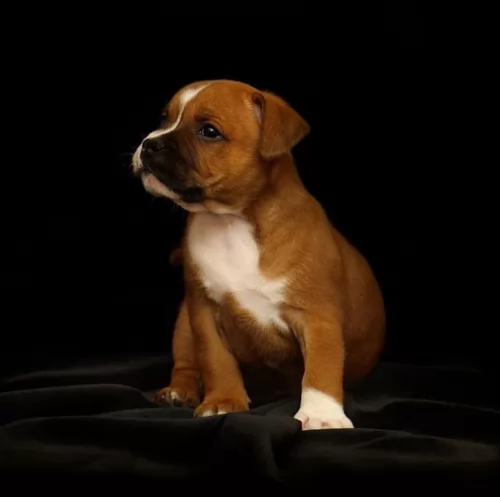 The Staffordshire is a muscular, stocky and unusually strong breed, small to medium size in height and build. They have broad, powerful chests, wide set, strong legs, strong shoulders, broad head with a fairly short muzzle. Their ears are not cropped but they are short and fold over. The coat is stiff, close and short and the tail is medium and carried low. Most Staffies are brown, but they can be red, brindle with white, fawn, black, white or blue.
The Staffordshire is a muscular, stocky and unusually strong breed, small to medium size in height and build. They have broad, powerful chests, wide set, strong legs, strong shoulders, broad head with a fairly short muzzle. Their ears are not cropped but they are short and fold over. The coat is stiff, close and short and the tail is medium and carried low. Most Staffies are brown, but they can be red, brindle with white, fawn, black, white or blue.
 The Xolo is one of those dogs who don’t get ill easily. He is also intelligent and fairly easy to train. Add to that the fact that he is also a low maintenance dog as he doesn’t have a coat that needs brushing and grooming.
The Xolo is one of those dogs who don’t get ill easily. He is also intelligent and fairly easy to train. Add to that the fact that he is also a low maintenance dog as he doesn’t have a coat that needs brushing and grooming.
Give your Xolo lots of attention because in exchange for the good care you give him, you’re going to get a loyal, devoted pet who loves to be with you constantly.
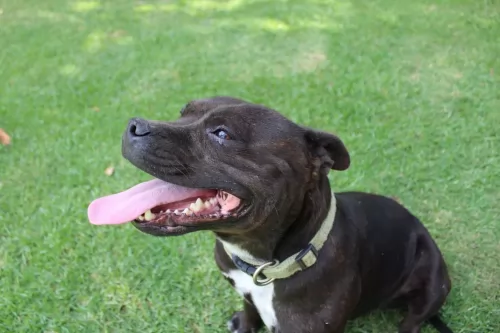 1.Children friendliness The breed adores children but care should still be taken because they are so strong and their jaws are so powerful.
1.Children friendliness The breed adores children but care should still be taken because they are so strong and their jaws are so powerful.
2.Special talents they adore children and they one of the most powerful jaws among canines.
 The Xoloitzcuintli is a hardy dog in terms of health and can live to a ripe old age in dog years – some have been known to reach 18, 19 and 20 years of age. Without a coat, this dog is susceptible to sunburn so care must be taken when outdoors.
The Xoloitzcuintli is a hardy dog in terms of health and can live to a ripe old age in dog years – some have been known to reach 18, 19 and 20 years of age. Without a coat, this dog is susceptible to sunburn so care must be taken when outdoors.
Hairless dogs tend to battle with skin problems such as pimples. Skin allergies can cause itching and scratching and these can lead to bacterial infections. It is interesting to note that the genes that bring about hairlessness also produce troublesome teeth, so that dental disease is quite rife with these dogs.
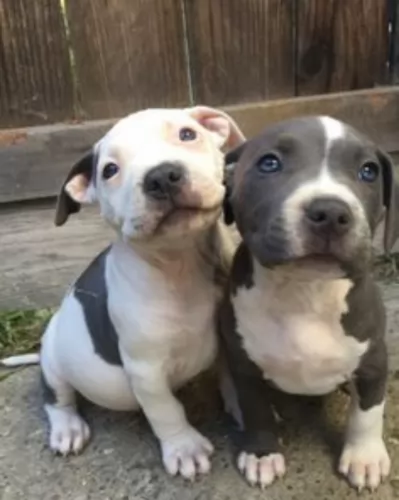 • Patella luxation otherwise known as a slipped kneecap- can cause pain and some lameness.
• Patella luxation otherwise known as a slipped kneecap- can cause pain and some lameness.
• Skin allergies and even a tendency toward Mange which is chronic in some forms and fatal in others.
• Like most active dogs their size, they are susceptible to bloat which can be fatal if not treated immediately.
 You’ve got to remember with this dog breed that he doesn’t have a coat so he can burn easily when out in the sun. If you know you’ll be in the sun for long, you’ll have to apply special sunscreen.
You’ve got to remember with this dog breed that he doesn’t have a coat so he can burn easily when out in the sun. If you know you’ll be in the sun for long, you’ll have to apply special sunscreen.
You can wipe down your Xolo or bath him from time to time, though not to often so as to strip the natural oils from the dog’s body. The nails will need to be trimmed regularly, as long nails can be a danger as they can hook on things and cause pain and bleeding.
Provide your hairless pet with a nice, soft bed to lie on.
Take him to the vet when he appears to be ill and see that you get his vaccinations done to prevent deadly illnesses such as rabies and parvo.
Check his eyes and ears for infections.
Brush his teeth to remove plaque. Never use human toothpaste. Take a look at the different canine toothpastes available.
Never leave your pet in a hot car with no windows open.
Provide your Xoloitzcuintli dog with high quality dog food so as to enhance health and longevity. Keep food simple for your pet to avoid digestive problems. Boiled chicken, brown rice or pasta and cooked potato, carrots and spinach can be chopped up and added to his dry kibble from time to time. Also a little bit of raw meat added in occasionally can also be excellent. Avoid feeding your pet foods such as onions, avocados, nuts, chocolate, coffee and raisins.
Make sure this dog has access to cool, fresh water night and day.
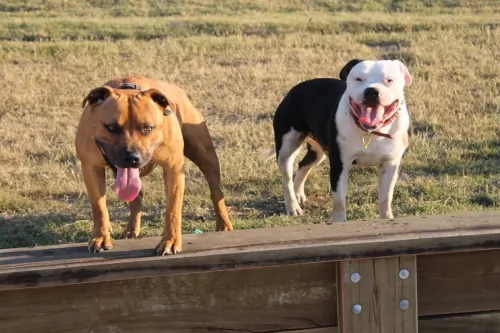 1.Feeding the puppy Don’t over feed as he grows fast. Feed a high quality dog food for medium size puppies. Feed 1-2 and a quarter cups in 3-4 meals per day.
1.Feeding the puppy Don’t over feed as he grows fast. Feed a high quality dog food for medium size puppies. Feed 1-2 and a quarter cups in 3-4 meals per day.
2.Feeding the adult Don’t exercise right before or after eating due to potential for bloat. Feed 1-2 times a day a high quality medium breed dog food.
4. Games and Exercises They are terriers after all and they dig. Need a fairly large yard with a strong fence. They love to play ball, frisbee and can excel at cart pulling.